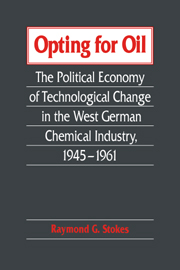Book contents
- Frontmatter
- Contents
- Preface
- Introduction
- Part I Background
- Part II Bargaining from strength: the political economy of technological change, 1949–1955
- 3 A new agenda, 1949–1955: Cold War, changing energy patterns, and the development of West German chemical technology
- 4 Rejoining the international community: international cooperation and technology transfer, 1951–1955
- Part III Alternative paths to plenty: case studies from the mid–1950s
- Part IV Consolidating the new regime, 1957–1961
- Index
3 - A new agenda, 1949–1955: Cold War, changing energy patterns, and the development of West German chemical technology
Published online by Cambridge University Press: 19 October 2009
- Frontmatter
- Contents
- Preface
- Introduction
- Part I Background
- Part II Bargaining from strength: the political economy of technological change, 1949–1955
- 3 A new agenda, 1949–1955: Cold War, changing energy patterns, and the development of West German chemical technology
- 4 Rejoining the international community: international cooperation and technology transfer, 1951–1955
- Part III Alternative paths to plenty: case studies from the mid–1950s
- Part IV Consolidating the new regime, 1957–1961
- Index
Summary
Writing in 1950 in West German chemical trade journal Chemische Industrie, Alfons Metzner, a frequent contributor of articles on the political economy of chemical technology, claimed that the Cold War had “convulsed [erschüttert]” the chemical industry: “The chemical industry is taking on a key position in the interplay of political forces and is therefore being brought into line [ausgerichtet] with purely political considerations.” As a key supplier to all other industries, including defense-related ones, the chemical industry did indeed play a central political role during the Cold War. But if one views the Cold War not simply as an attempt by both East and West to assert military ascendance over the other, but as a broader confrontation that was meant to demonstrate the superiority of one political-economic system over another, the chemical industry is seen to have been even more central: As an engine for economic growth, and especially as it contributed to an enhanced standard of living, the chemical industry could be instrumental in helping one of the sides to prevail in that struggle.
In the first half of the 1950s, then, just as had been the case in their previous experience, German chemists and chemical industrialists developed technologies in the sway of broader political and economic currents, with many of those currents originating outside German borders.
- Type
- Chapter
- Information
- Opting for OilThe Political Economy of Technological Change in the West German Industry, 1945–1961, pp. 67 - 108Publisher: Cambridge University PressPrint publication year: 1994



